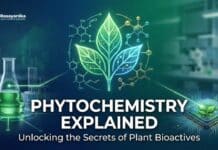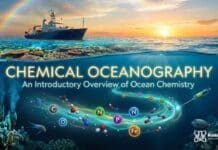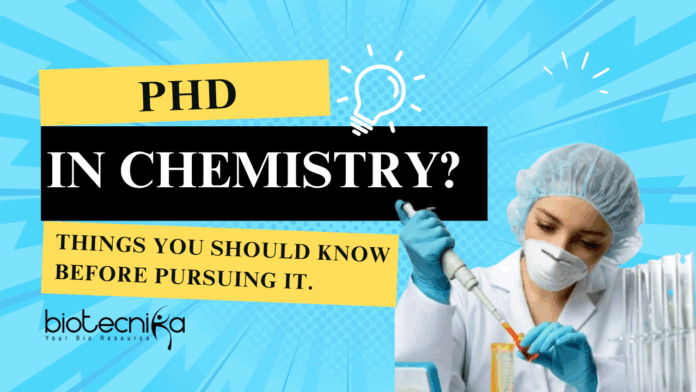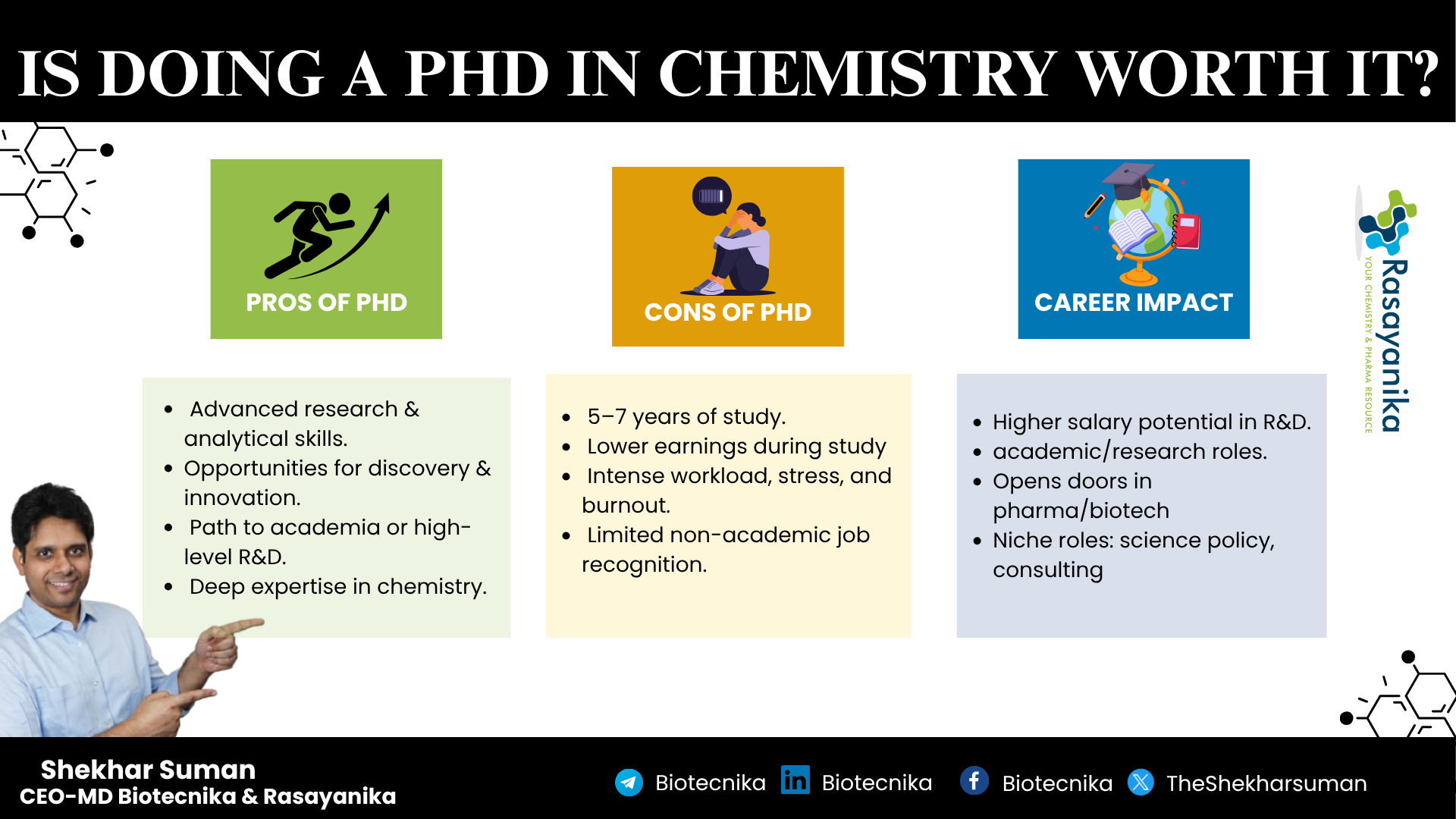Is a PhD in Chemistry worth it? It’s Pros, Cons, and Career Impact
“The Road Not Taken” is a well-known poem written by the famous poet Robert Frost. This poem is based on an incident while he was traveling. He found himself at a crossroads, diverging into yellow woods, which implies that he must choose one of the roads and move ahead without looking back. We often find ourselves in such situations in life, where we have to choose the right path.
Do you find yourself in a similar situation? Especially when choosing a career that requires a long-term commitment, efforts to achieve gratification after years, or to pursue a quick industry job. In this article, we will discuss whether a PhD in chemistry is worth it, its pros, cons, and career impact as we proceed.
Major subfields for doing a PhD in Chemistry.
- Organic chemistry
- Inorganic chemistry
- Physical chemistry
- Analytical chemistry
- Medicinal chemistry
- Environmental chemistry
- Biochemistry
- Polymer chemistry
- Computational chemistry
- Nano chemistry
Top colleges/Universities for PhD in Chemistry
| Institutes /Universities | Country | Specialization |
| IISc/IITs | India | Interdisciplinary chemistry, catalysis, nanotech, Organic, Inorganic, Physical, Materials |
| CSIR labs | India | Drug discovery, catalysis, and materials. |
| JNCASR | India | Supramolecular chemistry, nanochemistry |
| Massachusetts Institute of Technology (MIT) | USA | Chemical biology, materials, and physical chemistry |
| Harvard University | USA | Organic synthesis, medicinal chemistry |
| University of Oxford | UK | Synthesis, catalysis, quantum chemistry |
Is it worth it?
Chemistry is one of the most fascinating subjects that deals with the mechanism and interactions of matter when they are subjected to heat, cold, or with any other atoms, compounds, acids, bases, etc. Chemistry is everywhere, from as simple as the working of soap to clean dirt to global impacts like climate change, understanding how medicine works, or how to produce clean energy.
Choosing to do a PhD in Chemistry depends on a person’s personal choice and interest. So, are you someone who is deeply curious about the working mechanism of matter or passionate about learning about things that are deeply hidden from the naked eye, that require research to uncover the truth?
If yes, then you should pursue a PhD in Chemistry because this will give you gratification, even if you invest your time for a long period of time.
What are the Pros?
- Academia & Teaching.
A PhD in Chemistry will help you to become an expert in your niche (e.g., organic chemistry, analytical chemistry, etc). In most of the colleges and universities, a PhD is needed for an academic role like an Assistant or Associate Professor or a lecturer who basically supervises, teaches the graduate and postgraduate courses, and publishes research papers.
- Research and development.
Many positions in national labs or advanced industries require a PhD holder for their research and development as they will have a deep knowledge of their field, and this will help in critical thinking, managing, using instruments, and tools accurately. So, doing a PhD will land you in government or corporate laboratories or projects in sectors like defense, pharma, nanotech, and hospitals.
- High-paying jobs ( government & corporate industry)
A PhD holder can apply for senior positions in the government or advanced industries like biotech, data science, clinical research, etc., which will offer better CTC than the new joiners. Some companies usually seek a person who is an expert in their domain with perseverance and analytical skills.
- Entrepreneur
If you have marketing strategies, can commercialize, and are interested in turning your expertise into a startup or services of products like drugs, raw materials, or diagnostic tools, polymers, etc., you can become an entrepreneur.
- Networking & Global Collaboration.
Besides becoming an expert in a niche, a person with a PhD in Chemistry can expand their connections on a global scale with experts worldwide, offering or looking for opportunities through hosting events, collaborations, and conferences with various researchers, professors, and industry leaders.
What are the Cons?
- Time-consuming
If you want to pursue a PhD, you must be determined and persistent enough to invest a long period of time because a PhD can last around 4-7 years.
- Stress and burnout
While pursuing a PhD, you might not get the results of your research the right way; you need to be patient enough to keep trying until you get your correct results, and you need to keep yourself motivated to meet your deadlines, long lab hours, and failures. So, you can feel stressed and tired sometimes without a support system.
- Overqualification
Many industries offer entry-level positions that reject a PhD holder because they can’t afford to pay a high salary according to their qualifications, and they would take someone who has not done a PhD at a lower pay scale.
- Long duration
It will consume your time and energy, delaying you in landing a job or personal life milestones compared to your peers. Moreover, it delays financial stability, as the stipend given to a PhD holder is lower compared to their peers who directly enter industries as JRFs or other posts.
Who should consider it?
Are you still confused about whether to go for a PhD or not? Let me help you get an insight.
You should do a PhD in Chemistry if you are genuinely interested in knowing how things work, i.e., mechanism of the reactions that involve matter, elements, atoms, their nature and want to become an expert in your field, if you are interested in doing research and have enough patience to invest your time for a long period, ready for pathway with uncertainty.
The career impacts of a person who does a PhD in Chemistry.
- Academics and research –
With a PhD in Chemistry, you can either go for a role as an assistant or associate professor in colleges and universities. In India, you can enter a college or university through the CSIR-NET exam, which is conducted for entry-level positions like Assistant Professor.
- Industry –
You can become a researcher in a research and development team or apply for senior positions in various industries. Pharmaceuticals, cosmetics, food, agriculture, energy, and environment, etc., are some of the industries you can apply to after a PhD in Chemistry.
- Government labs –
A PhD in Chemistry will open doors for prestigious government institutions where you can apply for various Scientist roles, technical officer positions, Research associate, etc. You will get an opportunity to apply for a scientist role or a senior position in labs like- CSIR, DRDO, ISRO, ICMR & DBT labs, etc, or in renowned institutes abroad.
Just like the poet, sometimes people find themselves at crossroads so many times in their lives, like this “whether they should do a PhD in Chemistry or not?” is one of those situations where a person might feel like standing between two choices, but doing a PhD should depend on a person’s core values and interests. So, it depends on you if you want to choose to do a PhD in Chemistry or to go for a quick industry-based job like in dye industries, polymer industries, drug discovery, food industries, etc.
Whatever you choose is neither wrong, just with different outcomes.

















































